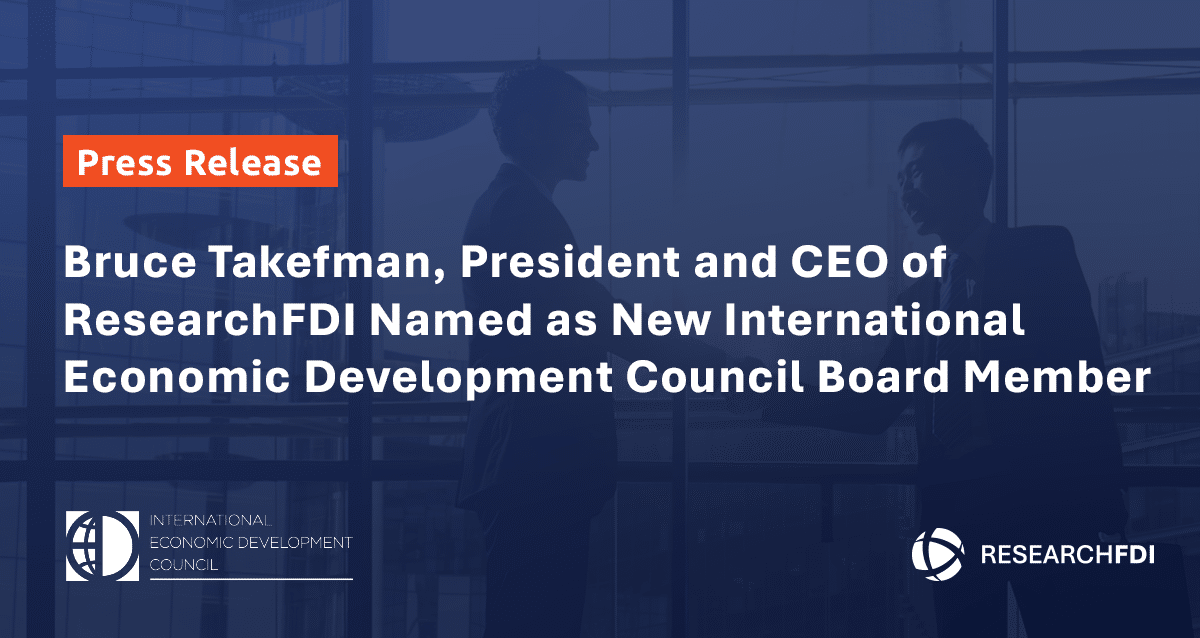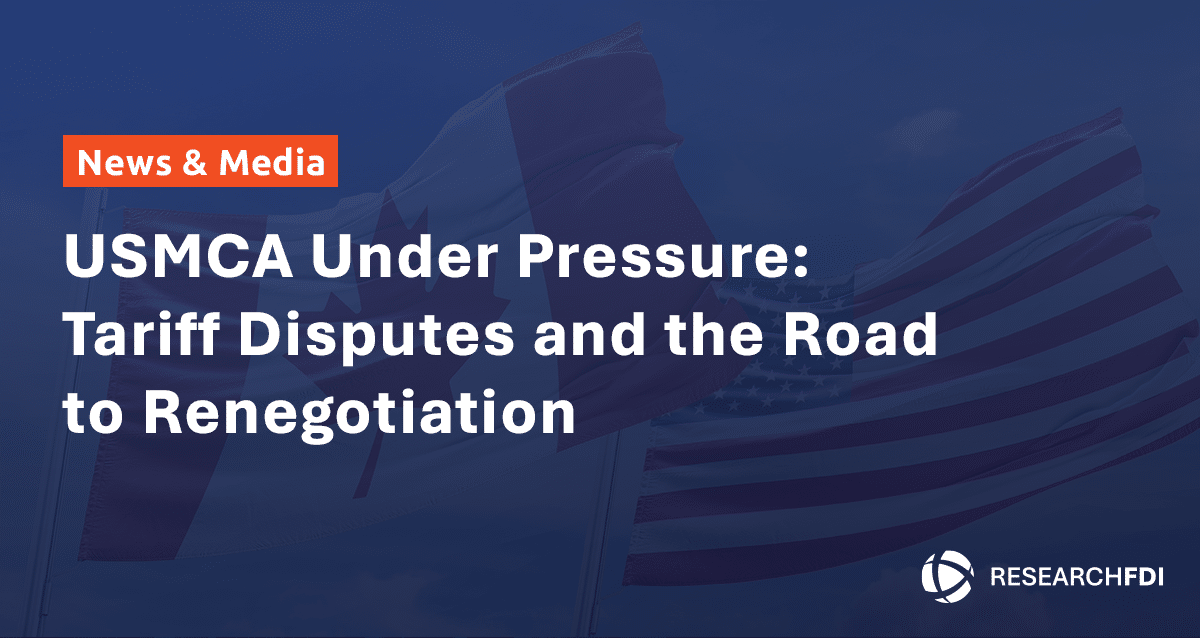Articles
The Latest
Explore expert insights and industry trends shaping economic development and FDI
ResearchFDI Academy and IEDC Partner to Elevate Global Investment Attraction Training, Launch Celebrated at IEDC Annual Conference in Detroit
September 24, 2025
Montréal, QC – [September 24,2025] – ResearchFDI Academy, the industry’s leading expert-led training platform for economic development professionals, is proud to announce its official partnership with the International Economic Development Council (IEDC). This collaboration provides practitioners with a professional development pathway to strengthen their foreign direct investment (FDI) expertise and earn the designation of Certified…
Featured Article
Bruce Takefman, President and CEO of ResearchFDI Named as New International Economic Development Council Board Member
September 23, 2025
FOR IMMEDIATE RELEASE - September 23, 2025, WASHINGTON, D.C. – ResearchFDI and the International Economic Development Council (IEDC) are proud to announce Bruce Takefman, President and CEO of ResearchFDI has been appointed to the IEDC Board of Directors for a two-year term, starting on January 1, 2026. The nomination was approved at IEDC’s 2025 Annual…
Featured Article
The Impact of Mega Airports: Why Large-Scale Aviation Infrastructure is Critical for Economic Growth
July 29, 2025
On any given day, the terminals of a mega airport pulse with activity: more like a small city than a transit hub. Thousands of workers move in sync as they guide cargo, manage logistics, and welcome travellers. Meanwhile, entire economies hum along in the background. These airports aren’t just infrastructure, they’re transformative. In 2025, mega…
Featured Article
Get more resources like this delivered straight to your inbox.

ResearchFDI Academy and IEDC Partner to Elevate Global Investment Attraction Training, Launch Celebrated at IEDC Annual Conference in Detroit
Announcements, Press Release
Montréal, QC – [September 24,2025] – ResearchFDI Academy, the industry’s leading expert-led training platform for economic development professionals, is proud to announce its official partnership with the International Economic Development Council (IEDC). This collaboration provides practitioners with a professional development pathway to strengthen their foreign direct investment (FDI) expertise and earn the designation of Certified…

Bruce Takefman, President and CEO of ResearchFDI Named as New International Economic Development Council Board Member
News & Media, Press Release
FOR IMMEDIATE RELEASE - September 23, 2025, WASHINGTON, D.C. – ResearchFDI and the International Economic Development Council (IEDC) are proud to announce Bruce Takefman, President and CEO of ResearchFDI has been appointed to the IEDC Board of Directors for a two-year term, starting on January 1, 2026. The nomination was approved at IEDC’s 2025 Annual…

The Impact of Mega Airports: Why Large-Scale Aviation Infrastructure is Critical for Economic Growth
News & Media
On any given day, the terminals of a mega airport pulse with activity: more like a small city than a transit hub. Thousands of workers move in sync as they guide cargo, manage logistics, and welcome travellers. Meanwhile, entire economies hum along in the background. These airports aren’t just infrastructure, they’re transformative. In 2025, mega…

The Impact of Green Technology on Regional Economic Growth: A 2025 Outlook
FDI Insights, News & Media
Have you ever driven through a rural area and noticed the seemingly endless rows of wind turbines and solar panels? As it turns out, those rural skylines dotted with solar farms and wind turbines fuel more than just clean energy; they’re powering economic booms. The Green Technology & Sustainability Market Report of 2025 forecasts the…

Why High-Speed Internet Is Crucial for Economic Growth in Rural Areas
News & Media
Imagine a rural entrepreneur with a bold idea for an online store, but her internet lags at dial-up speeds. Customers abandon their carts, her business falters, and her small town loses out on potential jobs and growth. This isn’t a rare scenario. It’s the stark reality of the digital divide, a persistent gap that hampers…

Unlocking the Potential of Smart Highways: How the Next Generation of Roads Will Impact Economic Development
News & Media
Smart stuff is everywhere: your thermostat, your watch, your phone (obviously), even your mirror’s got digital brains nowadays. So, smart highways? They’re not just inevitable; they’re here, and they’re about to shift economic development into high gear. These next-generation roads are truly impressive. They’re packed with sensors that help eliminate traffic jams, fix in-road cracks…

ResearchFDI and Great Lakes Economic Development Council Launch Strategic Training Initiative for Economic Developers
Announcements, Press Release
May 1, 2025 – ResearchFDI and Great Lakes Economic Development Council (Great Lakes EDC) are pleased to announce a new partnership to provide enhanced training and certification opportunities for economic development professionals across the Great Lakes region. This collaboration is designed to strengthen the skills of local professionals and support the attraction of foreign direct…

BCEDA and ResearchFDI Partner to Expand Economic Development Training in British Columbia
Announcements, Press Release
March 20, 2025 – The British Columbia Economic Development Association (BCEDA) is excited to announce a new partnership with ResearchFDI, a global leader in foreign direct investment and economic development research. This collaboration will support BCEDA initiatives, the BC Economic Summit, and a partnership to offer professional training programs eligible for CEDP.BC Certification credits, furthering…

Harnessing the Power of Artificial Intelligence for Strategic Economic Development
News & Media
By 2030, artificial intelligence (AI) could pump a staggering $19.9 trillion into the global GDP, according to PwC estimates—a windfall driven by productivity leaps and consumer benefits. Now, that astounding $19.9 trillion is not just a number; it’s a wake-up call for economic development leaders, decision-makers, and policymakers like you. Imagine your region riding that…

AI & SEO: How Artificial Intelligence Is Already Shaping the Future of Search Engine Optimization
News & Media
Google has become so ingrained in our daily lives that “Googling” is now a verb. It’s how we find answers, discover new ideas, and navigate the digital world. Every minute, 5.9 million searches are processed on Google—adding up to 354 million searches per hour, 8.5 billion searches per day, and a staggering 3 trillion searches…

USMCA Under Pressure: Tariff Disputes and the Road to Renegotiation
News & Media
It’s been a busy week, and we’re here to break down the major events in the USMCA (United States-Mexico-Canada Agreement) fallout and the potential future implications for the U.S., Canada, and Mexico. Recap On February 1, 2025, President Donald Trump announced a 25% tariff on imports from Canada and Mexico, citing national security concerns. According…

ResearchFDI Academy and EDCO Partner to Elevate Investment Attraction Training in Ontario
Announcements, Press Release
MONTREAL, January 23, 2025 – ResearchFDI and the Economic Developers Council of Ontario (EDCO) are thrilled to announce a groundbreaking partnership aimed at empowering Ontario’s economic development professionals with cutting-edge training and globally recognized certification. Through this collaboration, EDCO members will gain exclusive access to the ResearchFDI Academy at special discounted pricing, further enhancing their…
